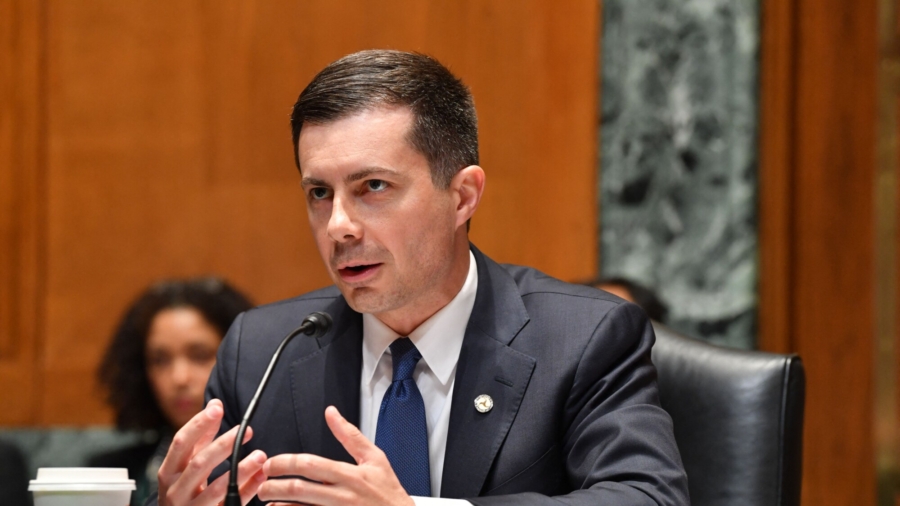Transportation Secretary Pete Buttigieg has indicated the United States needs to source more minerals domestically and from friendly nations in order to meet new demands for electric vehicles (EVs).
The supply chain for minerals used in EV batteries is heavily controlled by China. Buttigieg testified during a House Appropriations Committee hearing on Thursday that the Biden administration is working to upend China’s dominance in the mineral trade.
During an exchange at the hearing, Rep. Ryan Zinke (R-Mont.) said China controls, “either directly or indirectly,” more than 62 percent of the critical minerals needed for EV batteries.
“A condition we’re working hard to change in this administration,” Buttigieg replied.
Zinke went on to assert that the United States would need to increase its critical mineral mining output by 2000 percent over the course of 20 years to meet the existing demands from the EV industry.
“The chemistry of our batteries has not completely stabilized in a way that I think can be fully predicted,” Buttigieg responded before saying, “There’s no question that we need to source more minerals both domestically and from friendly countries.”
Zinke Says US Becoming More Dependent on China
During the hearing, Zinke continued to question Buttigieg on how much the Biden administration has considered the U.S. reliance on foreign suppliers as it moves to rapidly increase U.S. adoption of EVs while maintaining energy independence.
“We all want cleaner, better, more efficient,” Zinke said. “But your stated goal and President [Joe] Biden’s stated goal and my stated goal, and certainly President Trump’s is the same, is that we seek energy independence, we seek energy dominance so we’re not held hostage by foreign entities.”
Biden announced a goal in August of 2021 to have zero-emissions vehicles represent half of all new car sales in the United States by 2030. Some U.S. states, such as California, have set even more ambitious goals on EV adoption by legislating timelines to end sales of gas-powered vehicles by 2035.
Zinke asked how the administration is balancing its goals for the widespread adoption of EVs against the issue of energy independence. The lawmaker, who served as Secretary of the Interior under President Donald Trump, specifically asked if the Biden administration has done any assessments of how much mining would be needed and where the United States could find new sources of critical minerals to meet the expanding EV demands.
Buttigieg said “some of the finer points related to [mineral extraction] are probably better answered by my colleagues at the Department of the Interior.” Zinke continued to press Buttigieg on whether the Biden administration had completed any assessments on sourcing the critical minerals to meet their EV goals, but Buttigieg did not say.
Zinke went on to say that multi-agency reports authored under the Trump administration asserted that “unless we change the supply chain first, our pursuit of EVs makes us more dependent on China.”
“I would argue that our action to win the EV future cannot wait,” Buttigieg said in response.
Biden Administration’s EV Incentives
The Biden administration has sought ways to incentivize the more rapid adoption of EVs. Provisions of the Biden-backed Inflation Reduction Act of 2022 allow for up to $7,500 in tax credits for EV purchases, so long as the vehicles meet certain supply chain criteria.
Already, some automobile industry analysts have expressed concerns that many EVs currently on the market would not be able to meet the supply chain criteria necessary to receive the full set of EV tax credits. Those tax credit eligibility requirements will grow even tighter in the coming years as the Treasury Department will require even higher percentages of components to be produced domestically.
The U.S. Treasury Department will also begin imposing “foreign entity of concern” provisions over the next two years. The Treasury Department guidance states that, beginning in 2024, “an eligible clean vehicle may not contain any battery components that are manufactured by a foreign entity of concern and beginning in 2025 an eligible clean vehicle may not contain any critical minerals that were extracted, processed, or recycled by a foreign entity of concern.” The “foreign entity of concern” provision is anticipated to specifically preclude Chinese firms from involvement in the electric vehicle supply chain.

